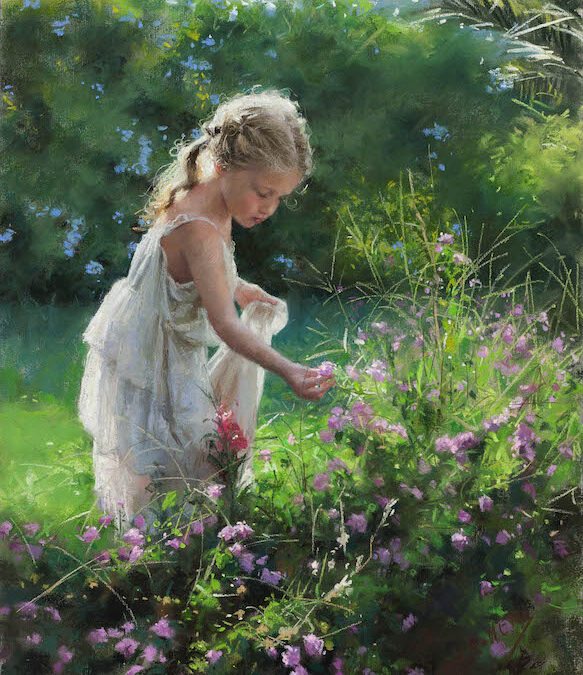Nurturing a child’s whole self, includes nurturing their spiritual nature and helping them and supporting them in developing a spiritual core. This is actually very important for their development into adolescence and their overall health and wellbeing.
Research shows that actively fostering a child’s spirituality can have an incredibly positive impact in adolescence; and that children who are raised with a robust and well-developed spiritual life are happier, more optimistic, more thriving, more flexible, and better able and equipped to deal with life’s waves, hardships and challenges. Engaging with one’s spiritual side is associated with enhanced emotional resilience, academic success, and notably, a reduction in anxiety and depression.
Supporting spiritual development in children develops a child’s strong sense of self and confidence; builds resilience, notably reduces anxiety and depression and helps the child be better equipped at handling life’s adversities as adult ; cultivates empathy, compassion, sense of fairness and high values; and it allows the child to nurture and strengthen their connection to the world, their feeling of belonging, purpose and life’s interconnectedness. Faith is important in a person’s life, and having something higher of higher values and ethics to look up to and aspire towards is important for our overall development.
What is spirituality?
It is the space we enter within ourselves when we seek to know who we truly are; it is where we develop a spiritual core, a stability that goes beyond the physical, so that we can rely on it to be held and stay rooted in a truth beyond the external. It is an inner sense of our relationship to that which is greater than all of us, to a higher power that is loving and guiding on our path ahead. It is what inspires us to develop and embody virtue and be kind people, and to develop faith and trust because this will hold us throughout our life. It is what inspires us to seek, to be on an adventurous quest of exploration, to have meaning and feel purpose in our life, and to understand our unique and purposeful place within the universe.
In this world that we live in, there is constant pressure for the ever more, the ever bigger. But such a path would never be fulfilling. And if we encourage them to lead lives where appreciation comes from achieving, rather than cherishing and creating, then they’ll grow up believing that this is the only way they would be loved – not for who they truly are, but for they have achieved.
Children have their own unique paths and should be supported, unconditionally. We carry the responsibility that we will be paving the roads they’ll walk on – not by our teaching, rules and words, as they will follow our actions. Showing them rather than teaching them is what matters.
To show them how to make the ordinary come alive, develop their spiritual core and create a life of purpose, fulfillment and virtue, we ourselves need to lead that kind of mindful life. We’ll have to constantly contend with the pressure of the ever more, ever bigger that our culture seeks to impose on all of us. We’ll have to sometimes take the hard unpaved roads sometimes, because we decided to stay true to our values and ethics.
This all takes courage, discipline and perseverance – to walk slowly, live simply and see clearly. It takes courage to see the extraordinary wonder in a daisy. It takes courage to see clearly beyond those that paint sparkling pictures. It takes courage to see the world as it really is, yet have the audacity to imagine how it could be.
Children already know how to make the ordinary come alive. They see the world through wonder and curiosity, finding pleasure in the little things. In fact, it is they who remind us of what the essence of life is and re-connect us to the divine love and our heart. So all we have to do is continue to encourage their natural connection, curiosity and wonder within them.
We see their connection to the spiritual through how they give names to animals, toys and all else around them. In many Indigenous cultures, Name Giving is an important tradition, because it is the reminder that spirit is imbued in everything, and that it flows through everything. The giving of names creates deeper connection as well as inspires respect, caring and paying attention to all around us. It is essentially a dialogue with what negates the rational; it is a dialogue with the mysterious, a language of the sacred.
Children do this automatically because they are more connected to their psychic senses and the otherworld, thereby understanding the natural connection. We should encourage treating nature and wildlife with respect as this carries significant wisdoms they’ll hold forever in their lives.
Ways to nurture child’s spirituality
- Foster a connection with nature: I already talked about this above, so continue to support their connection to nature and wildlife, and be curious about their thoughts, ideas and emotions, and wonderful natural name giving understandings.
And you too can feel more inspired to connect with nature more deeply, seeing that wonder in your child’s eyes, how it approaches all with a kind of reverence, appreciation and the freedom for the other little creature or flower to be itself in your child’s presence. A child loves unconditionally and accepts the other as is; and this is what true love is. Allow yourself too to slow down, walk a kindness and patience of rhythm, and remind yourself of the importance of presence.
The mutual exploration allows us to deepen our relationships, and nature is our greatest teacher in many ways; we witness the cycles of the land, the temperatures and seasons, and we see how all has its time; we can’t push seeds into the frozen ground in winter for flowers will not grow yet. Nature shows us the interconnection of all of life, and when we respect animals and all, we respect one another; nature teaches us the virtues, the richness of simplicity, and the what true beauty really is.
- Spark curiosity for life’s big questions: Curiosity is an opening, and it is important. However, sometimes parents can feel a little too overwhelmed with the constant big questions, so they may say “I don’t know”, or “The answer is …”, or “The answer is not … because it’s not real.” In other words, try to stay away from specifics about what you think or not, let the child explore this.
Instead of saying who God is to you, or what they should believe in, or whether or not he exists at all, try approaching the big question with an response on just sharing something spiritual as an experience. For example, referring to whether God exists or not or how he looks like, you can just say, “I’m not sure but I feel alive when …” sharing some experience of yours, or saying “I feel most connected to something greater beyond us all when …”. And then ask your child, “What do you feel?” And then, listen. Listen openly and intentionally. Listen with your full presence.
- Encourage creative arts: I was in a Christian monastery a while ago, as I love monasteries, and one of the nuns there said, “God didn’t leave us with rules nor prohibitions, he left us with creativity and the freedom to express it, so others can rejoice in joy and inspiration for their own talents also.”
Creativity is important for a child’s spiritual nature, and it also helps the child express itself and its emotions, make sense of the world; and it is through creative expression that children usually deepen their spiritual connection. Whether music, painting, building toys, dancing, reading stories and writing, engaging with playfulness and self expression nurtures great joy and a profound sense of belonging.
- Create reflective spaces: Children go through a lot in their inner worlds, which is why stories and fairy tales are so important for them and their wellbeing. It’s important for them to engage in mindfulness and reflection, and the way we can encourage this is through giving them some quieter times, whether by themselves where we don’t tell them what to do and also with us, when they can have the ability to ask us questions or share with us whatever they want.
You can set a “comfy cozy calming place” where you can go there before bedtime, read stories, have your mystical talks and magical talks and share mystical secrets or exploring exciting quests for knowledge! You can even have a poster of different emotional expressions if the child is little and ask them how they feel about different things.
The intention of this comfy cozy place or corner is to create a space where the child can feel comfortable enough to share with you anything – and you need to stay open minded and receptive, so that the child continues to share. Eventually, the child may be sharing if something bothered them or hurt them at school, and you’ll have the beautiful opportunity to be there for your child and hold that space. Spirituality is about being our true selves, and when we feel seen, heard and held in the way we need to, this is so deeply important for our development, fulfillment and wellbeing.
Taking this further by:
Help your child align to their inner compass and trust their guidance. Teach them how to feel their feelings, help them with understanding intuition and the language of their body or how their intuition speaks uniquely to them.
Share spiritual and mystical experiences, and don’t shy away from that. You can also use stories and tales and then discuss the wisdoms inside them and what lessons the characters went through, how the child felt about the story and characters – this may open important and much treasured dialogues of spiritual nature between you.
Encourage curiosity and learning, as this nurtures and develops the traits needed for inner self exploration, which spirituality is based upon.
Instill in your child the virtues and spiritual values by activities supporting these; because it’s not just about the “words”, it is the actual activities and experiences that matter. For example, encourage creativity as I mentioned, such as music and movement to promote interconnection, joy and belonging. And activities such as sharing food nurtures kindness, humility, generosity and inspiring interconnection also. Something like gardening or working on some project they love will nurture their devotion and sense of discipline to show up and do the work rather than be focused or expect instant gratification.
And most importantly, love them unconditionally and give them the freedom to be themselves. Children need a lot of loving, a lot of cuddles, a lot of affection and emotional warmth from you. Instilling in them a sense of guiding loving power and light will give them the solid foundation they need for life. The importance of unconditional love cannot ever be overstated, and truly, it is at the core of everything.
For personal readings with me, you are welcome to browse through my Offerings.

For more of my writings, browse through my Art of Love.
If you wish to support me and my work, you may do so by sharing it or donate here. For personal readings with me, you may visit my Offerings.
Your support means so much to me! Thank you wholeheartedly!
Cover art is by Vicente Romero Redondo, whose art I absolutely love. His official website is https://vicenteromeroredondo.com/ All rights reserved by the artist.




